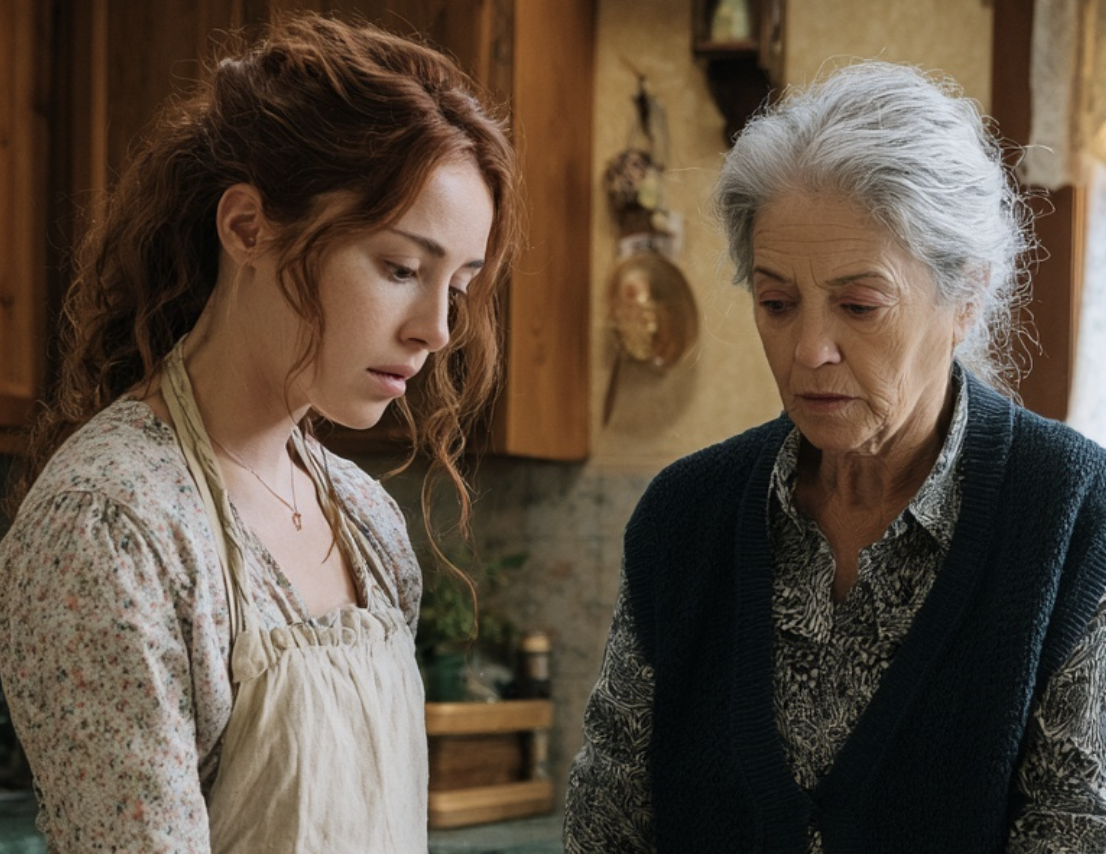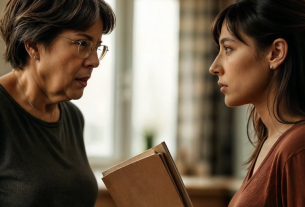Elena Vladimirovna was standing at the stove, stirring soup, when her husband walked into the kitchen and tossed an invitation onto the table.
“Your class reunion,” Sergei said without looking up from his phone. “This Saturday.”
She glanced at the invitation. Thirty years since graduation. A pretty card with gold lettering.
“You’re going, right?” she asked, wiping her hands on her apron.
“Of course. Just make yourself presentable at least—you look like a frump. Don’t embarrass the family.”
The words knocked the wind out of her. Elena froze, ladle in hand. Sergei was already heading for the door when their sons—Maxim and Denis—walked into the kitchen.
“Mom, what’s this?” Maxim picked up the card.
“A class reunion,” she answered quietly.
“Oh, cool! And you’re going to wear that same old robe of yours there?” Denis laughed.
“Don’t make fun of your mother,” Sergei’s mother, Raisa Petrovna, interjected as she walked in, wearing the expression of someone about to give wise advice. “You just need to work on yourself a bit. Touch up your hair, buy a decent dress. You need to look respectable.”
Elena nodded silently and went back to the stove. Her chest ached, but she didn’t show it. In twenty-six years of marriage she had learned to hide her hurt deep inside.
“Dinner’s ready,” she announced half an hour later.
The family gathered at the table. The borscht was perfect—just the right tang, tender beef, and fragrant herbs. Alongside it were freshly baked bread and cabbage pies.
“Tasty,” Sergei grunted between spoonfuls.
“As always,” added her mother-in-law. “At least you can cook.”
Elena ate a few spoonfuls and went to wash the dishes. In the mirror above the sink she saw the tired face of a forty-eight-year-old woman. Gray roots, little lines by her eyes, a dimmed gaze. When had she gotten so old?
On Saturday Elena got up at five in the morning. First she needed to prepare dishes for the reunion—everyone had to bring something. She decided to make several at once: solyanka, herring under a fur coat, pies with meat and cabbage, and for dessert—bird’s milk cake.
Her hands knew what to do. Chop, mix, bake, decorate. In cooking she found peace. Here she was the master; here no one criticized her.
“Wow, you cooked a lot,” Maxim said in surprise, coming down to the kitchen at eleven.
“For the reunion,” his mother answered briefly.
“And did you buy yourself anything new at least?”
Elena looked at the only decent black dress hanging on the chair.
“This will do just fine.”
By two o’clock everything was ready. Elena changed, put on makeup, and even wore earrings—Sergei’s gift for their tenth wedding anniversary.
“You look okay,” her husband assessed. “Let’s go.”
Svetlana Igorevna’s country house was impressive. Their former classmate had married a businessman and was now hosting guests in a mansion with a pool and a tennis court.
“Lena!” Svetlana hugged her. “You’ve hardly changed! What did you bring?”
“A few dishes,” Elena set the containers on the table.
Some had gotten rich, some had aged, but they all recognized each other. Elena kept to the side, watching classmates trade stories about their successes.
“Guys, who made this solyanka?” Victor, the former class monitor, called out. “It’s a masterpiece!”
“Lena did,” Svetlana pointed to her.
“Lenochka!” A short man with kind eyes came up to her. “Do you remember me? Pavel Mikhailov, sat at the third desk.”
“Pasha! Of course I remember,” she said, delighted.
“Did you make the solyanka? I’m blown away! And these pies… I don’t think I’ve ever eaten anything better.”
“Thank you,” Elena said, embarrassed.
“No, I mean it. I’ve lived in Belgrade for ten years now—Russian cuisine is very popular there, lots of Russian restaurants—but I haven’t seen this level. You’re not a professional cook, by any chance?”
“No, just a housewife.”
“‘Just’?” Pavel shook his head. “You’ve got real talent.”
All evening people came up to Elena, asked for recipes, praised the food. She felt… important. Needed. For the first time in many years.
Meanwhile Sergei talked about his auto repair shop, glancing at his wife now and then in surprise—where was all this attention coming from?
Monday began as usual—breakfast, cleaning, laundry. Elena was ironing her sons’ shirts when the phone rang.
“Hello?”
“Lena? It’s Pavel—we met on Saturday.”
“Pasha, hi,” she said, surprised.
“Listen, I was thinking… I’ve got a business proposal for you. Can we meet? Talk?”
“About what?”
“About a job. In Serbia. I want to open a Russian-cuisine restaurant; I need a coordinator. Someone with good taste who can train the cooks and put together the menu. The pay is good, plus a profit share.”
Elena sat down. Her heart was pounding.
“Pasha, I… I don’t know what to say.”
“Think about it. Call me tomorrow, okay?”
All day she walked around in a daze. A job in Serbia? A restaurant? She, a simple housewife?
At dinner she tried to tell the family.
“Can you imagine, I was offered a job…”
“What job?” Denis snorted. “You can’t do anything except cook.”
“That’s exactly what they offered. In Belgrade, at a restaurant.”
“Belgrade?” Sergei repeated. “What nonsense is that?”
“Mom, what are you talking about?” Maxim set down his fork. “How old are you? Forty-eight?”
“Besides,” the mother-in-law chimed in, “who will take care of the household? Run the home? Cook?”
“Come on, someone was probably just joking,” Sergei waved it off.
Elena fell silent. Maybe they were right? Maybe it really wasn’t serious?
The next day it happened again. At breakfast Sergei eyed her critically.
“You’ve put on weight,” he concluded. “You should exercise.”
“Mom, by the way,” Denis spread butter on his bread, “don’t come to my graduation, okay?”
“Why?” Elena asked, taken aback.
“Well, all the parents are so… stylish. And you’re kind of… outdated or something.”
“Deniska’s right,” his brother agreed. “No offense, it’s just we don’t want the guys talking afterward.”
Her mother-in-law nodded along:
“They’re right. You need to take care of yourself. In our day women stayed beautiful into old age.”
Elena stood up from the table and went to her room. With trembling hands she dialed Pavel’s number.
“Pasha? It’s Lena. I agree.”
“Seriously?” Joy rang in his voice. “Elena, that’s wonderful! But I’ll warn you right away—the work won’t be easy. A lot of responsibility; you’ll have to work hard and make decisions. Are you ready?”
“I’m ready,” she answered firmly. “When do I start?”
“In a month. We need to handle paperwork and a visa. I’ll help with all of it.”
The month flew by. Elena processed documents, studied Serbian, put together the restaurant menu. Her family treated the idea skeptically, considering it a passing whim.
“She’ll live there a month or two and realize home is better,” Sergei told his friends.
“The main thing is that she doesn’t lose money on this,” her mother-in-law echoed.
The sons didn’t take her plans seriously at all. To them, their mother was part of the interior—she cooked, washed, cleaned. What could she possibly do in another country?
On the day of departure Elena got up early. She made food prep for a week, left instructions for laundry and cleaning. She went to the airport alone—everyone was “busy.”
“We’ll be in touch,” Sergei muttered in farewell.
Belgrade greeted her with rain and new smells. Pavel was waiting at the airport with a bouquet of flowers and a broad smile.
“Welcome to your new life,” he said, hugging her.
The next months flew by like a single day. Elena handled hiring, put together the menu. It turned out she could not only cook but also manage, plan, and make decisions.
The first guests arrived in three months. The dining room was packed; people stood in line. Borscht, solyanka, dumplings, blini—everything sold out instantly.
“You have golden hands,” Pavel would say. “And a bright mind. We’ve created something special.”
Elena looked at the happy faces of the guests, listened to the compliments, and realized—she had found herself. At forty-eight, she had begun to live anew.
Half a year later Sergei called.
“Lena, how are things? When are you coming home?”
“Everything’s fine. I’m working.”
“And when are you coming back home? We’re barely managing here.”
“Hire a housekeeper.”
“Hire who? With what money?”
“With the same money I lived on for twenty-six years.”
“What’s that supposed to mean?”
“Nothing special. It’s just that I was my family’s unpaid housekeeper—until I left for a class reunion and ended up on business in another country.”
Silence hung on the line.
“Len, maybe we can talk normally? Without resentment?”
“Sergei, I’m not resentful. I’m just living. For the first time in my life—I’m living.”
The conversation with her sons was similar. They couldn’t understand how their mother had suddenly become independent, successful, needed by more than just them.
“Mom, stop playing businesswoman,” Maxim said. “The house is falling apart without you.”
“Learn to live on your own,” Elena replied. “You’re twenty-five.”
Sergei didn’t object to a divorce. It was merely a legal acknowledgment of a fait accompli.
A year passed. The restaurant “Moskva” became one of the most popular in Belgrade. Elena received offers from investors to open a chain; she was invited onto cooking TV programs, and restaurant critics wrote about her.
“A Russian woman who conquered Belgrade,” she read in a local headline.
Pavel proposed to her on the restaurant’s anniversary. Elena thought for a long time before saying “yes.” Not because she didn’t trust him—he was a good man. She just liked being independent.
“I won’t be cooking for you every day or washing your shirts,” she warned.
On the restaurant’s second birthday Sergei flew in with the sons. Seeing a successful, self-assured woman in a business suit accepting congratulations from local celebrities, they were taken aback.
“Mom, you… you’ve changed,” Denis mumbled.
“You’ve become beautiful,” Maxim added.
“I’ve become myself,” Elena corrected them.
Sergei spent the whole evening walking around silently, now and then casting surprised glances at his ex-wife. In the evening, when the guests had gone, he approached her.
“Forgive me, Lena. I didn’t understand…”
“Didn’t understand what?”
“That you’re a person. An individual. That you have talent, dreams, needs. I thought of you as part of the family… part of the house.”
Elena nodded. There was no anger—only sadness for the years wasted.
“Maybe we could start over?” he tried.
“No, Sergei. I have a different life now.”
Today Elena is fifty. She owns a chain of restaurants, her own cooking show on local television, and a cookbook that became a bestseller. She’s married to a man who values her as a person, not as a free housekeeper.
Sometimes her sons call. They say they’ve understood a lot, that they’re proud of their mom, that they want to come visit. Elena is glad to hear them, but she no longer feels guilty for living for herself.
Sometimes she stands in the kitchen of her flagship restaurant, watching the chefs prepare her signature dishes, and thinks: “What if I hadn’t dared back then? What if I had stayed a frumpy housewife in a robe?”
But she quickly drives those thoughts away. Life doesn’t give everyone a second chance. She was lucky—she took it.
Starting over at forty-eight is scary. But it turns out to be the only way to understand who you really are.



